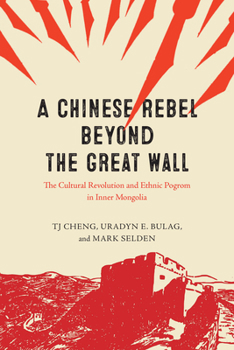A Chinese Rebel Beyond the Great Wall: The Cultural Revolution and Ethnic Pogrom in Inner Mongolia
A striking first-person account of the Cultural Revolution in Inner Mongolia, embedded in a close examination of the historical evidence on China's minority nationality policies to the present. During the Great Leap Forward, as hundreds of thousands of Chinese famine refugees set their sights on the promise of Inner Mongolia, Cheng Tiejun arrived in 1959 as a middle school student. In 1966, when the PRC plunged into the Cultural Revolution, he joined millions of students and young intellectuals in the Red Guards just as Inner Mongolia's longtime leader, Ulanhu, was purged and the region descended into a living hell for Mongols. With the military in control, and with deepening conflict with the Soviet Union and its Mongolia ally on the border, Mongols were accused of being nationalists and traitors. A pogrom of torture and killing followed, taking more than 16,000 Mongol lives by official count, the heaviest toll anywhere in China. At the heart of this book are Cheng's first-person recollections of his experiences as a rebel. These are complemented by a close examination of the documentary record of the era from the three coauthors. The final chapter offers a theoretical framework for Inner Mongolia's repression. Its goal, the authors show, was not to destroy the Mongols as a people or as a culture--that is, it was not a genocide. It was, however, a "politicide," an attempt to prevent an officially recognized nationality from exercising leadership of an autonomous region. This unusual narrative provides urgently needed primary source material to understand the events of the Cultural Revolution, while at once offering a novel explanation of contemporary Chinese minority politics involving the Uyghurs, Tibetans, and Mongols.
Format:Paperback
Language:English
ISBN:0226826864
ISBN13:9780226826868
Release Date:October 2023
Publisher:University of Chicago Press
Length:416 Pages
Weight:1.45 lbs.
Dimensions:0.9" x 5.9" x 8.9"
Customer Reviews
0 rating





